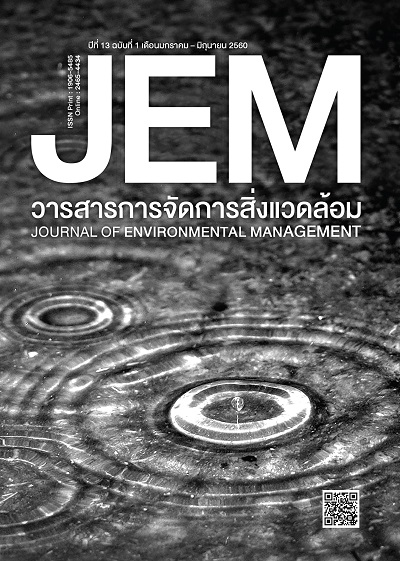ความสามารถทนเค็มน้ำทะเลของสายพันธุ์หญ้าแฝก SEA WATER SALINITY TOLERANCE OF VETIVER GRASS CULTIVARS IN GENOTYPIC DIFFERENCE
DOI:
https://doi.org/10.14456/jem.2017.3บทคัดย่อ
การทดลอง เรื่อง ความสามารถทนเค็มน้ำทะเลของสายพันธุ์หญ้าแฝก มีวัตถุประสงค์เพื่อทดสอบความสามารถหญ้าแฝก 2 สายพันธุ์ คือ สายพันธุ์ลุ่ม ได้แก่ ชนิดพันธุ์กำแพงเพชร 2 ชนิดพันธุ์สงขลา 3 และสายพันธุ์ดอน ได้แก่ ชนิดพันธุ์ นครสวรรค์ และชนิดพันธุ์กำแพงเพชร 1 ต่อระดับความเค็มน้ำทะเล 0 8.00 16.0 24.0 32.0 และ 40.0 พีพีที ระหว่างการทดลองทำการตรวจวัดอัตราการรอดชีวิต อัตราการเพิ่มขึ้นของน้ำหนัก อัตราการเพิ่มขึ้นของความสูง อัตราการเพิ่มขึ้นของความยาวราก การเปลี่ยนแปลงระดับค่าความเค็ม และการเปลี่ยนแปลงค่าความเป็นกรด-ด่าง พบว่าอัตราการรอดชีวิต อัตราการเพิ่มขึ้นของน้ำหนัก อัตราการเพิ่มขึ้นของความสูง การเปลี่ยนแปลงระดับค่าความเค็มและการเปลี่ยนแปลงค่าความเป็นกรด-ด่างไม่มีความแตกต่างกัน (p>0.05) แต่มีความแตกต่างกัน (p<0.05) ในส่วนของอัตราการเพิ่มขึ้นของความยาวราก และมีอิทธิพลร่วมกันเฉพาะในส่วนของความยาวรากเท่านั้น สรุปได้ว่า หญ้าแฝกสายพันธุ์ลุ่มมีความสามารถในการเจริญเติบโตและเพิ่มความยาวรากได้ดีกว่าหญ้าแฝกสายพันธุ์ดอน แต่ทั้งสองสายพันธุ์ไม่มีความสามารถในการลดระดับความเค็มของน้ำทะเลลงได้ ระดับความเค็มที่หญ้าแฝกเจริญเติบโตได้ดีอยู่ในช่วง 0 พีพีที ถึง 8.00 พีพีที เท่านั้น
This study aimed at comparing the salinity tolerance and the ability to reduce the sea water salinity of four vetivergrass ecotypes, i.e. Chrysopogonziz anioides (L.) Roberty, ecotype Kamphaeng Phet 2 and Songkhla 3, and C. Nemoralis (Balansa) holttum, ecotype Nakhon Sawan and Kamphaeng Phet 1 in different levels of salinity: 0, 8.00, 16.0, 24.0, 32.0, and 40.0 ppt. Measurements included percentage survival, percentage weight gain, percentage increase in height, percentage increase in length of roots, sea water salinity level, and pH. The results showed that the genotypes of vetiver grass cultivars had no significant relationship with resistance to sea water salinity level given all the measurements, except the percentage increase in the length of roots. In general, the Vetiveria zizanioides (L.) Nash genotype could grow and increase in root length better than the Vetiveria nemoralis A. Camus genotype. However, the two genotypes only grow well in a certain range of sea water salinity, from 0 ppt to 8.00 ppt, and the vetiver grass cultivars were not able to reduce the salinity of the sea water.
เอกสารอ้างอิง
Department of Marine & Coastal Resources. (2008). Management Strategies to Prevent and Solve the Problem of Coastal Erosion [In Thai]. Bangkok: Ministry of Natural Resources and Environment.
Khunwasi, C. & Chadchawan, S. (2006). Internal Transport System in Plant [In Thai]. Bangkok: Department of Botany, Faculty of Science, Chulalongkorn Univers ity.
Luiz, L., Paula, L. & Debora, T. (2011). Coastal Erosion Control and Landscaping Using Vetiver Grass. Paper Presented at the Fifth International Conference on Vetiver, CSIR–Central Institute of Medicinal and Aromatic Plants, Luckno w, India.
Office of Supervision and Land Development. (2007). Vetiver Grass for Soil and Water Conservation [In Thai]. Bangkok: The Land Development Department.
Padej, S. (2005). Coastal Land and Coastal Areas [In Thai]. Bangkok: Office of Marine and Coastal Resources Conservation, Department of Marine and Coasta l Resources.
Pantip, U. (2011). Biogeography [In Thai]. Bangkok: Department of Geography, Faculty of Education, Ramkhamhaeng University.
Pongwichian, P., Yamclee, P., Pruegsapong, A., & Potipan, P. (2002). Salinity Effect on Growth of Vetiver Grass [In Thai]. Bangkok: The Land Development Department.
Ratchanee, S. & Wongsa, W. (2010). The Benefit of Vetiver Grass in Agriculture and Engineering [In Thai]. Bangkok: Land Development Department.
Rossukon, H. (1999). Introduction to Statistical Analysis [In Thai]. Bangkok: Department of Statistics, Faculty of Science, Ramkhamhaeng University.
Sirichai, U. (2004). Sirichai Statistic V.6 [In Thai]. Chiang Mai: Department of Agronomy, Faculty of Agricultural Production, Meajo University.



